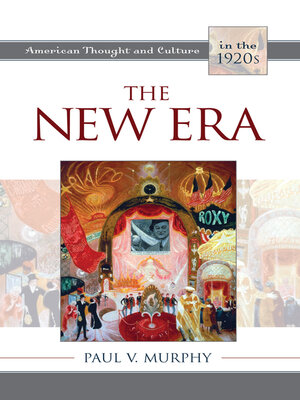The New Era
ebook ∣ American Thought and Culture in the 1920s · American Thought and Culture
By Paul V. Murphy

Sign up to save your library
With an OverDrive account, you can save your favorite libraries for at-a-glance information about availability. Find out more about OverDrive accounts.
Find this title in Libby, the library reading app by OverDrive.



Search for a digital library with this title
Title found at these libraries:
| Library Name | Distance |
|---|---|
| Loading... |
In the 1920s, Americans talked of their times as "modern," which is to say, fundamentally different, in pace and texture, from what went before—a new era. With the end of World War I, an array of dizzying inventions and trends pushed American society from the Victorian era into modernity.
The New Era provides a history of American thought and culture in the 1920s through the eyes of American intellectuals determined to move beyond an older role as gatekeepers of cultural respectability and become tribunes of openness, experimentation, and tolerance instead. Recognizing the gap between themselves and the mainstream public, younger critics alternated between expressions of disgust at American conformity and optimistic pronouncements of cultural reconstruction. The book tracks the emergence of a new generation of intellectuals who made culture the essential terrain of social and political action and who framed a new set of arguments and debates—over women's roles, sex, mass culture, the national character, ethnic identity, race, democracy, religion, and values—that would define American public life for fifty years.
The New Era provides a history of American thought and culture in the 1920s through the eyes of American intellectuals determined to move beyond an older role as gatekeepers of cultural respectability and become tribunes of openness, experimentation, and tolerance instead. Recognizing the gap between themselves and the mainstream public, younger critics alternated between expressions of disgust at American conformity and optimistic pronouncements of cultural reconstruction. The book tracks the emergence of a new generation of intellectuals who made culture the essential terrain of social and political action and who framed a new set of arguments and debates—over women's roles, sex, mass culture, the national character, ethnic identity, race, democracy, religion, and values—that would define American public life for fifty years.







